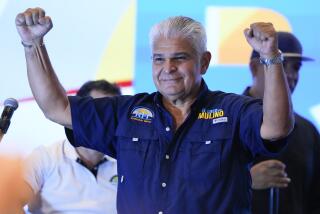‘A Little Wiser,’ Jamaicans Vote Today
- Share via
KINGSTON, Jamaica — “I think we’ve all grown a little older and wiser and more mellow with the years,” one-time socialist firebrand Michael Manley said, explaining both his conversion to moderate politics and the relatively bloodless calm that has preceded today’s election in Jamaica.
Upward of a million Jamaicans will go to the polls to choose between the debonair Manley, 64, who twice led the country between 1972 and 1980, and Prime Minister Edward Seaga, 58, who for eight years was President Reagan’s closest ally in the Caribbean.
According to three national voter surveys, Manley will win handily. The most authoritative poll, taken last week, forecasts a landslide, with Manley’s People’s National Party taking at least two-thirds of the 60 seats in Parliament.
The three-week campaign has generated relatively little bloodshed compared to Jamaica’s last contested election, in 1980, when more than 700 died in campaign-related violence. Up until election eve on Ash Wednesday, a national holiday for which the PNP and Seaga’s Jamaica Labor Party suspended campaigning, the police attributed only 10 violent deaths and perhaps a score of injuries to party rivalry.
“It’s even been friendly,” marveled Manley, noting that in some of what in 1980 were the bloodiest precincts of Kingston, hundreds of members of the rival parties danced together in street “peace” festivals.
Although in the final days of the campaign each candidate had bitterly charged the other with plotting election-day violence, on election eve both men urged their supporters to stay calm.
“Go peacefully to the polls on Thursday,” Seaga urged about 1,000 dancing, singing supporters at Tivoli Gardens, a housing project that he induced the government to build in his own election district.
‘Respect for Life’
“We cannot begin to build a Jamaica that is worth something unless we begin with a respect for life,” Manley told a crowd three times as large at historic Halfway Tree in central Kingston.
Following security procedures established for previous elections, Seaga called up military reservists to support the 3,000 troops and 7,000 police who will keep a close watch on polling places and areas that have been the most turbulent in past campaigns.
To the repeatedly expressed relief of both Manley and Seaga, none of the half-dozen violent incidents that marred the current campaign occurred near the tourist resorts on Jamaica’s north coast. The incidents, one of which became bloody only after police intervened, were confined to relatively remote rural districts and the historically violent slum areas of Kingston.
Both parties are acutely sensitive to the election’s possible impact on tourism, Jamaica’s leading industry, which was crippled a decade ago by the country’s reputation for violence and was all but killed by the shock of the bloody 1980 campaign.
Although the conservative Seaga and socialist Manley fought a bitterly ideological campaign in 1980, the run-up to today’s election has been almost absent of issues, because both men are now in rough agreement on a centrist, pro-U.S. course for government by either party. Manley has adopted Seaga’s pro-business approach to economic growth, and Seaga has proposed a wide-ranging expansion of social services, leaving virtually no broad areas of disagreement.
The two men are atypical in an island nation whose people are overwhelmingly black. The pale-complexioned Manley is of English, Irish and African descent, with long generational ties to Jamaica, while Seaga, who was born in Boston, is the son of an expatriate Lebanese travel agent and a Scottish mother.
Racial origins have never been an issue in a Jamaican election, but Seaga’s more recent family ties to the country have been subtly exploited in a rousing Manley campaign song, “My Leader Born Here.”
More to Read
Sign up for Essential California
The most important California stories and recommendations in your inbox every morning.
You may occasionally receive promotional content from the Los Angeles Times.













